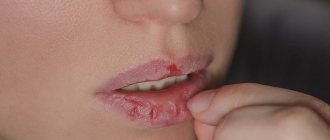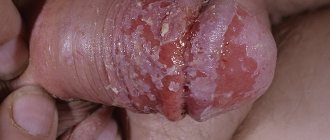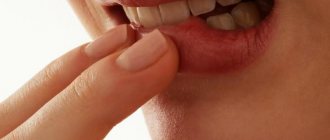In everyday life, fever on the lips is called herpetic rashes. You can often hear that a person has a “cold” in the mouth area. However, such symptoms are in no way related to ARVI. The causative agent of herpes is a virus. Hypothermia and colds are not the cause of rashes on the lips; they can only provoke the activity of the microorganism. Skin manifestations of infection, especially on the face, spoil a person’s appearance. Therefore, I want to get rid of sores near the mouth as soon as possible. But the herpes virus is not always easy to treat, and treatment may take some time.
Herpes virus
Lip fever is caused by herpes simplex virus type 1. About 80-90% of people are carriers of it, since the infection is very easily transmitted. However, this microorganism does not cause skin rashes in everyone. The virus becomes active only in the presence of additional unfavorable factors.
Many patients are interested in the question: “How to cure lip fever?” Currently, there is no drug that can destroy the causative agent of the disease. Once it enters the body, the virus invades cellular structures and remains there forever. However, with the help of drug therapy, it is possible to suppress the activity of the pathogen. And then the symptoms of the disease disappear. But the virus remains in the body, and fever on the lips may reappear when immunity decreases.
You don't have to catch a cold
Once it appears in the body, herpes does not disappear. For most people, it sits quietly in the cells of the nervous system, exacerbating a couple of times a year, or even less often. Frequent relapses occur in only 10-20% of infected people. Each such case must be dealt with separately by an immunologist. After all, an infection can have a destructive effect on all systems of the body. There is also data on the oncogenic properties of herpes.
The virus is activated by any decrease in immunity, so “fevers” often occur against the background of flu and colds. However, the appearance of painful blisters on the lip is not a symptom of respiratory infections, but an independent pathology. And in the same way, herpes can worsen after a protracted serious illness or from stress, as a result of severe overheating, great fatigue, hypovitaminosis and other negative aspects.
Why is herpes in the ear dangerous? And how to distinguish pathology from habitual otitis Read more
Transmission routes
How is the herpes virus transmitted? This is a rather insidious microorganism that can spread in various ways. This is why many people are asymptomatic carriers of the virus. However, you can only become infected from a person suffering from an acute form of herpes. Infection occurs in the following ways:
- Through a kiss or oral-genital contact with the patient.
- By airborne droplets. The patient can transmit the virus to others by coughing or sneezing.
- The infection is transmitted through personal objects, such as a towel, toothbrush or lipstick.
- Infection is possible when sharing utensils with a sick person.
- A pregnant woman with acute herpes can infect her unborn child in utero.
- In rare cases, a person can infect themselves. Inaccurate application of creams and ointments may spread the rash from affected areas to healthy ones.
It is important to remember that the herpes virus is quite stable and can live outside the body for about 4 hours. Therefore, healthy people easily become infected through objects and utensils that the sick person has come into contact with. Then this microorganism penetrates through the mucous membrane into the nerve endings and settles there forever.
Provoking factors
As already mentioned, fever on the lips does not always appear when infected with the herpes virus. The microorganism becomes active and causes skin manifestations when exposed to the following factors:
- frequent colds;
- hypothermia (especially after being in a hot room);
- intoxication;
- excessive exposure to the sun;
- nervous tension;
- pregnancy complicated by toxicosis;
- coffee abuse;
- following a too strict diet, malnutrition;
- avitaminosis;
- smoking and drinking alcohol.
All of the above factors lead to a weakened immune system. As a result, the virus is activated, and external manifestations of herpes infection occur.
Complications
It’s better to pay enough attention to this problem and immediately think about what to do if you have herpes on your lip. The herpes virus itself does not pose very serious threats, but certain factors can cause serious complications.
The state of immunity and treatment play an important role in this. If the immune system is so weak that it does not show an independent reaction to the herpes virus, all hope remains for external treatment.
However, if you don’t do this and just start herpes, there can be dangerous consequences. This development often leads to damage to the nervous system, which in turn can cause encephalitis or meningitis.
At a minimum, therefore, it is important to find out in time how to properly treat herpes on the lips. Recent studies have shown that herpes is one of the causes of the so-called fatigue syndrome. It may be more serious - Alzheimer's disease also originates from a simple herpes virus.
Important points when contacting a dermatologist if you have a hair disease.How to care for braces
- ADVANTAGES OF TREATMENT ABROAD
Symptoms
Signs of the disease depend on the stage of development of the herpes infection:
- Stage 1. The virus travels along nerve pathways to the lip area. The skin in the mouth area turns red, there is a slight itching and tingling sensation. Some patients experience flu-like symptoms: malaise, slight fever, chills, body aches. If you start treatment at this stage, it will help avoid the formation of a blistering rash.
- Stage 2. Inflammation occurs in the affected areas, accompanied by the appearance of blisters. The rashes are filled with clear liquid. Over time, the bubbles become larger. The itching becomes more severe, and painful sensations appear in the lip area.
- Stage 3. The blisters burst and ulcers form in their place. At this time the patient is especially contagious. There is a high risk of infecting others.
- Stage 4. Crusts form on the affected areas. They should never be torn off, as they protect the ulcers from infection. Sometimes the crusts rupture on their own with active movements of the mouth.
Patients often ask: “How to get rid of lip fever in a short time?” It is impossible to quickly eliminate the external manifestations of the disease. Usually, it takes about 7-14 days from the appearance of the first signs of skin damage to complete recovery.
It is important to remember that herpes on the lips is not as harmless as it seems at first glance. Frequent exacerbations of infection negatively affect the heart and blood vessels. Herpes is especially dangerous for pregnant women. This disease increases the risk of miscarriage and can also lead to infection of the embryo. Because of this, the newborn may suffer from encephalitis of herpetic etiology.
How to fight a “cold”?
If herpes appears for the first time or in a baby under 6 months, and the disease is accompanied by fever and affects not only the lips, then you need to consult a pediatrician for antiviral therapy.
Often recurrent infections go away on their own. But you can shorten their duration by using local antiherpetic agents (active ingredient acyclovir).
Ways to reduce discomfort:
- apply a cold compress to the area of the rash;
- avoid sour and spicy foods;
- choose cool drinks;
- if there is severe pain, then use ibuprofen or paracetamol;
- Do not use products containing lidocaine due to possible side effects or overdose.
How to prevent the spread of the virus:
- it is important to ensure that the child does not scratch the rash and wash his hands;
- use individual dishes, towels, toothbrushes for a child with a herpes infection;
- during an exacerbation, you should not engage in contact sports;
- a child with a “cold” on his lips should not kiss other people.
Medications
Treatment of fever on the lips is aimed at deactivating the virus. There are special drugs that remove pathogen DNA from skin cells. As a result of this therapy, the manifestations of the disease disappear.
At the first stage of the disease, when there are no blistering rashes yet, antiviral tablets are prescribed:
- "Acyclovir";
- "Gerpevir".
These medications need to be taken twice a day for about 3-4 days. In many cases, drug therapy can prevent the blisters from appearing. However, medications in tablet form are effective only in the first days of illness.
At the stage of the appearance of rashes and the formation of ulcers, it is necessary to use antiviral ointments for fever on the lips:
- "Zovirax";
- "Acyclovir";
- "Fenistil Pentsivir";
- "Gerpevir".
These products must be applied very carefully using a cotton swab. Do not smear the drug on the skin, as this will cause the rash to spread to healthy areas.
At the stage of healing and crust formation, you need to use emollient ointments and creams based on zinc.
In some patients, exacerbations of herpes occur very often, more than 5 times a year. How to treat fever on the lips in such difficult cases? For persistent relapses of infection, a long course of immunomodulators is prescribed:
- "Viferona";
- "Cycloferon";
- "Kipferon";
- "Ingarona";
- "Amiksina".
These drugs stimulate the production of interferon in the body and help strengthen the immune system.
In severe cases, after relief of acute symptoms of the disease, the herpes vaccine “Vitagerpavak” is administered. It protects against relapse of the disease. After 6 months, the vaccine is repeated to consolidate the results. One of the indications for vaccination is frequent exacerbations of herpes (more than 4 times a year).
Requires sacrifices
It is better to avoid decorative cosmetics (lipstick, lip gloss). They dry out the lips and, in addition, can spread the infection to other places. To hide defects on the lip, it is better to use a pharmaceutical antiherpetic patch. But if you simply cannot imagine yourself without cosmetics, at least take the product with a cotton swab and immediately dispose of it after application. But it is better to use lip balms containing petroleum jelly and allantoin to moisturize and soften herpetic sores.
Also, during illness, it is better to abandon contact lenses and replace them with glasses. This will reduce the risk of inflammation of the cornea of the eye - herpetic keratitis, which can even threaten blindness.
It is believed (although this has not been proven) that a special diet helps reduce the incidence of herpes. You should limit, or better yet completely avoid, foods that contain large amounts of arginine: beef, nuts, chocolate, raisins and all flour products. Fatty and salty foods and sweet carbonated and caffeine-containing drinks are undesirable at this time. On the contrary, foods rich in l-lysine (an antagonist of arginine) are useful during this period. These include boiled or baked potatoes, dairy products, boiled pork, lamb and poultry, egg whites, soybeans, lentils, fish, fruits and vegetables. For drinks, preference should be given to pure water and tea without sugar (the body requires at least 1.5-2 liters of liquid per day).
Well, the last sacrifice that will be required during the treatment of an exacerbation of herpes is a temporary refusal from sex (as a last resort, you should use a condom and refrain from kissing).
ethnoscience
Folk remedies for lip fever should be used together with antiviral tablets and ointments. Before using them, you should consult your doctor. The following home remedies are recommended:
- Applying ice. This remedy is effective in the first days of the disease, when there is redness of the skin, but there are no blisters yet. It is useful to make ice from chamomile infusion. The compress is applied to the reddened area for 15-20 minutes.
- Kalanchoe. The juice is squeezed out of the plant leaf and the rashes are treated with it several times a day.
- Brewing tea. Brew 3 tablespoons of black tea in a glass of boiling water. This product should be used to moisten the rash. Tea has anti-inflammatory and antiviral effects.
- Lemon. You need to squeeze the juice out of the fruit and apply it to the rash. Lemon acts as an antipruritic.
Treatment of herpes
We all know that there are traditional and medical methods for treating herpes. What to choose is up to you, but a more reliable solution would be to visit a doctor. A dermatologist or immunologist will help you identify the problem if you have not done so yourself and prescribe appropriate treatment.
Personally, I have never had to suffer from herpes, but I remember how my student friend had a difficult time with it. Herpes often manifested itself not only from diseases, but also from simple drafts. But the problem was not new to him, and therefore he knew what had to be done.
First of all, drug treatment - suitable tablets for herpes, which the doctor had previously prescribed to him. In addition, he treated the problem area of the skin with an ointment, which helped quickly eliminate the symptoms and protect the skin from unnecessary damage.
This is because this is precisely the general treatment regimen, when the patient is prescribed an integrated approach. This works well in the initial stages when symptoms are still mild. In advanced cases, consulting a doctor is already necessary.
Prevention measures
To avoid relapse of herpes, you need to strengthen your immune system. To do this, you need to eat regularly and nutritiously, take vitamins, and spend as much time as possible in the fresh air.
During the period of exacerbation of the disease, it is necessary to avoid the spread of infection. Under no circumstances should blisters on the skin be punctured or squeezed out. You should touch the rashes as little as possible, and after treating the affected areas with medications, you should wash your hands thoroughly. After recovery, it is recommended to change your toothbrush and towel.
It is important to take care of the health of those around you, because herpes is very contagious. A sick person must use separate utensils and personal items. During an exacerbation, the patient should refrain from kissing and oral-genital contact to avoid infecting others.










